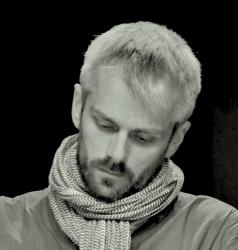Description:
1) Four or five separate spaces in one house are all filled with painful noises of fish factories, reproduced through speakers in all corners. All the spaces utilized are white, except one small storage room, full of junk.
2) Headphones lie around here and there, and hang from the trees outside. Inside you can try to listen, but the noise makes the stories hard to hear. Outside you can actually listen to fish factory workers and sailors, native and migrant, tell stories from their days at work. 3)A sculpture on the wall: half a sphere of polished metal, surrounded with fake euro-coins that are probably containers for chocolate, distributed in a way that is tempting to see as sunrays, and yet too chaotic … more like sunwind, disturbances. Or mountains and valleys. In the metal sphere the visitor sees his own reflection.
Reflections:
“There are children in this world who get nothing to eat. So be grateful and finish up your boiled cod and potatoes!” The status of the third world has been that of a myth or a fairytale for Iceland, so remote from Africa and Asia. As well as America and Europe for that matter. The absolute, something close to hell, a valuable tool to cultivate a general guilt-based morality. But all of a sudden the third world is here. And we are there. There are new kids on the block all around. We are all direct participants in each others’ lives. That is, we live in direct and obvious master-slave relationships, instead of hidden, mythical ones.
If not quite aristocratic, Iceland is very much a nouveau riche. With great taste for coffee. An interest in the arts. Cars – expensive and numerous. Architecture is even expected in the country, anytime now. The first thing to do when you have superfluous wealth: smell good. That is, get someone else to do the slimy fish stuff.
The president of the republic seems to be smiling behind the mask, in a fish factory in China, where Chinese girls handle fish caught in Russia – for money that will go directly to Iceland. The news reporter accidentally hits the nail on the head as he introduces the new deal: “Better use is made of raw material here, where Chinese substitute machines.”
And the position of the gallery itself next to a lively kindergarten underlines more or less everything.
Friendship among the nouveau riche and entrepreneurs is always defined by business, and the other way around. In a rather crude way, their/our stories serve a purpose. Defamation or aggrandizement, why are you telling this story? But the stories heard through the headphones are neither told nor mediated for any simple or direct goal. They are stories, that’s all – and, precisely for that reason, a political act.
The political question of our times meets with the deeply personal. The mystery of the exhibition: Why is this not kitschy? Why does it work? It is so simple, so self-evident, it should be absolutely banal. But it is astonishing.
(Haukur Már’s piece has been edited due to space limitations. He has much more to say on these issues, and we are working on getting him more space for future issues.)
The Sound of Money, Chapter 3 by Ólafur Árni Ólafsson & Libia Pérez de Siles de Castro. Gallery ASÍ, May 14 – July 3, 2005, Reykjavík Arts Festival.
Buy subscriptions, t-shirts and more from our shop right here!
















